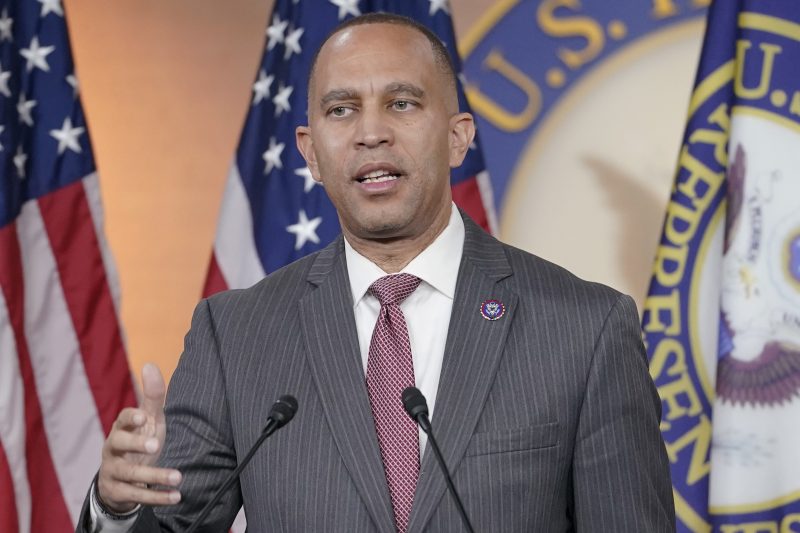House Democrats won two-thirds of the most competitive races in November, leaving them narrowly in the minority but with at least 10 GOP-held seats ripe for the taking in 2024.
Senate Democrats defended every seat of their own in these midterm elections, while also plucking a GOP seat in Pennsylvania to buy a little extra insurance for their majority ahead of the difficult election in two years.
Yet neither Democratic caucus has named their campaign chair for the 2024 election cycle more than five weeks after Election Day.
“Those discussions are ongoing. According to the caucus rules, the incoming leader will have until the middle of February or so to make that decision. I expect that it will happen much sooner than that,” Rep. Hakeem Jeffries (D-N.Y.), the incoming House minority leader, told reporters last week.
Insiders hope the new chair of the Democratic Congressional Campaign Committee can get announced before Christmas, or at least by the end of this month.
Senate Majority Leader Charles E. Schumer (D-N.Y.) and his allies seem to be squarely focused on trying to tie together the legislative loose ends of the lame-duck session, before the House flips to GOP control when the new Congress is sworn in Jan. 3.
His decision for who chairs the Democratic Senatorial Campaign Committee might slip into the new year.
By contrast, Republicans are off to an early start. Almost a month ago, Sen. Steve Daines (R-Mont.) and Rep. Richard Hudson (R-N.C.) won unanimous elections to take over the National Republican Senatorial Committee and National Republican Congressional Committee, respectively.
The slow-moving process is an indication of where the two caucuses view themselves in terms of 2024, with House Democrats seeing a growing field of contenders to run the campaign arm and Senate Democrats stuck in political limbo.
For Jeffries, this is shaping up as his first big test as the incoming leader, as House Speaker Nancy Pelosi (D-Calif.) departs the leadership stage and leaves behind an almost unparalleled fundraising legacy.
Two candidates, Reps. Ami Bera (D-Calif.) and Tony Cardenas (D-Calif.), emerged for the DCCC this year, but a clutch of Democrats began to campaign for a different way to pick the chair, leaving it in the hands of whomever the Democratic leader is, rather than an open campaign before the entire caucus.
That change won approval a few weeks ago, but it became clear that, if either Bera or Cardenas were a popular enough choice, the caucus would have just gone ahead and elected one without changing the rules.
This has left Jeffries in a slight bind, trying to find the right person for a complex job that requires good candidate recruiting skills, fundraising acumen and a willingness to travel practically nonstop for two years. But he is also trying to walk the caucus’s delicate tightrope of identity politics, aware that any choice could upset a faction of the caucus.
Whoever lands the DCCC post stands to elevate their stature as the potential majority-making chairman.
Democrats start the 2024 campaign in better-than-expected shape given that the November elections left Republicans clinging to a majority with just 222 seats and Democrats at 213. The battlefield starts out tilting in the Democratic direction.
That’s due, at least in part, to how the GOP committees devoted resources in an uneven fashion, spending heavily to win deep-blue seats in suburbs outside New York and Los Angeles. But Republicans left a few more evenly divided seats undernourished in the Midwest, allowing Democrats to win despite a tough political climate.
Republicans hold 18 seats in districts that favored President Biden in 2020, including five in which he defeated Donald Trump by more than 10 percentage points and five more that Biden won by at least 5 percentage points, according to officials with the DCCC and NRCC.
Democrats hold just five seats in districts Trump won, four of which Biden lost by 4 percentage points or less.
Democratic aides have said that Bera and Cardenas have received interviews with Jeffries, but the field has expanded and the longer the process takes, the less likely the decision lands on one of those two.
To some degree lawmakers and leadership aides are looking across the caucus and creating potential DCCC chairs in their minds, with little clarity into whether these Democrats actually want the job.
Those mentioned include Reps. Don Beyer (Va.), a top DCCC fundraiser; Kathy Castor (D-Fla.), who for four years has chaired a select climate committee; Suzan DelBenne (D-Wash.), a former chairwoman of the New Democrat Coalition; Lizzie Fletcher (D-Tex.), a prolific fundraiser who won a GOP seat in 2018 and is now in a safe district; and Robin L. Kelly (Ill.), who has served as the Illinois Democratic Party chairwoman.
The longer Jeffries takes to mull his options, the more candidates could pop up, with their supporters whispering in his ear. The main purpose of empowering the leader to make this selection was to eliminate internal caucus politics from the job, something that harmed the two previous DCCC chairs, Reps. Cheri Bustos (Ill.) and Sean Patrick Maloney (N.Y.).
To win the post in the leadership elections, each made promises to constituencies within the caucus that helped them win but also created lingering tension with other factions.
Now Democrats have given Jeffries the power to make the choice — but he still hasn’t made it.
Schumer’s first excuse for not naming a new campaign chief was Georgia, where Sen. Raphael G. Warnock (D) had to compete in a runoff election last week to lock down the 51st seat for the Democratic caucus.
But it’s also true that there are very few Democrats angling for the job — and very few might be an overestimate. So far no one has stepped forward to indicate any interest.
And it will take one of Schumer’s best sales jobs to land a DSCC chair, given the political landscape.
Democrats are defending 23 seats in their caucus in two years, and that includes three states (Montana, Ohio and West Virginia) where Biden lost by large margins in 2020. And Democrats must defend five more seats (Arizona, Michigan, Nevada, Pennsylvania and Wisconsin) that Biden won by less than 3 percentage points.
Coming off his successful 2022 tenure, Sen. Gary Peters (D-Mich.) received some encouragement to do a second term running the DSCC. But Peters begged off, having just run his own brutal 2020 reelection and then the 2022 DSCC, as he gets ready for likely another tough 2026 reelection campaign.
Beyond that potential candidates get floated through conversations among campaign operatives, former Senate aides who now lobby and media types, spitballing names into the ether to see if any are interested. HuffPost approached a half-dozen Democrats or their aides earlier this week, and the responses all came back the same: “Zero interest.”
This Senate class has posed previous problems for Democratic leaders to find a campaign boss. In late 2010, heading into the 2012 cycle, Majority Leader Harry M. Reid (D-Nev.) got rebuffed by several choices before he finally cajoled Sen. Patty Murray (D-Wash.) into taking over the DSCC, in addition to her leadership post and committee chairmanship.
In late 2016, after others declined the 2018 term, Schumer settled on a brand-new senator, Chris Van Hollen (Md.), fresh off his own 2016 win, to lead the DSCC.
Now Schumer, who is known for playing his heavy role at the campaign shop, will have to spend even more time finding someone to lead the uphill campaign for the next two years.



























